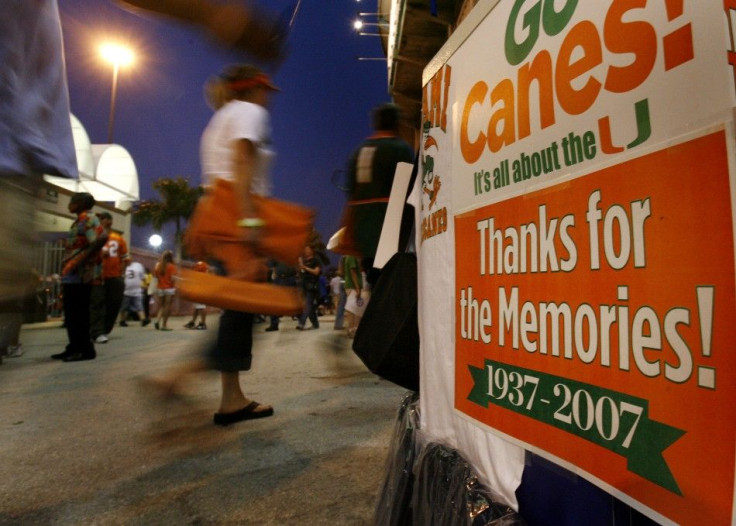Miami Hurricanes Football Scandal: Five Possible Outcomes

In a scandal that has rocked the college football world, a former booster of the University of Miami has blown the whistle on illegal activities surrounding the school's athletic program, more pecifically its football team.
Nevin Shapiro, a former University of Miami booster and self-described lifelong fan, told Yahoo! Sports that he provided benefits to at least 72 college athletes over the past decade as well as a few coaches. Big named NFL players such as Vince Wilfork, Jon Beason, Devin Hester and Jonathan Vilma were among the dozens of athletes implicated in the report across two sports.
Shapiro is currently serving a 20-year prison sentence in New Jersey for an $83 million Ponzi scheme, (Some of the funds were paid to Miami athletes and officials including University President Donna Shalala.) He decided to come forward because he felt betrayed by athletes who he once considered friends. He said when he needed them most, those athletes abandoned him.
The evidence compiled by Charles Robinson, investigative report for Yahoo!, is damning if true. The NCAA is reportedly working with Shapiro as it compiles a case on Miami athletics.
Over the past few years, there have been numerous scandals at high profile college football programs like Ohio State University and the University of Southern California. Bowl appearances, coach dismissals and player suspensions have been the resulting outcomes from those scandals. However, if the Miami report is true, the penalties imposed on the school would probably top them all.
What happens next is anyone's guess. Here are five possible outcomes for the University of Miami athletic program, specifically its football team.
Death Penalty: It hasn't happened often but when it does - it sets a program back for a long time. The death penalty is when the NCAA prohibits a school from participating in a sport for an entire year. The most recent prominent example is Southern Methodist University in the mid 1980s after it was revealed the university was paying recruits and players. Death penalty basically forces the school to release all scholarship players, recruits and coaches. The team has to start from scratch. The loss of the 1987 and 1988 seasons has set the school's football program back to this day. Ouch.
Suspensions: Since they are in the pros, players like Wilfork, Beason and Hester get off scott free in terms of punishment. However, numerous players implicated in the scandal are still on the Hurricanes team today. Players like starting QB Jacory Harris and All-American linebacker Sean Spence reportedly accepted money from Shapiro. If the NCAA finds out these players did violate its rules and regulations, they are definitely going to get suspended.
Lighter Sentences: Like USC, the Miami scandal may lead to the school not being eligible for bowl games and getting scholarships stripped. To incoming coach Al Golden, who has remained fairly mum on the issue, this could represent a best case scenario.
ACC Gets Raided: There have already been numerous rumors circulating that the Southeastern Conference (SEC) is looking to poach a few teams from Miami's Atlantic Coastal Conference (ACC). The case against the ACC is strong as is in terms of team success. If Miami gets served the death penalty and is forced to sit out a year, teams like Clemson and Florida State may have even more reason to leave. Many say the downfall of the Southwestern Conference all began when Southern Methodist got served the death penalty.
NCAA: If the Miami scandal turns out to be true, it would mean three of college football's biggest programs were in serious violation of NCAA regulations in a short two year span. A ton of criticism has already been aimed at the NCAA for the fact that so many schools turn a blind eye to its rules and regulations regarding boosters. This could finally be the tipping point that forces the NCAA to rethink the way it handles things. Some, like Miami Dolphins wide receiver Brian Hartline, says the NCAA needs to pay college athletes. It's unlikely, but you never know.
© Copyright IBTimes 2024. All rights reserved.





















